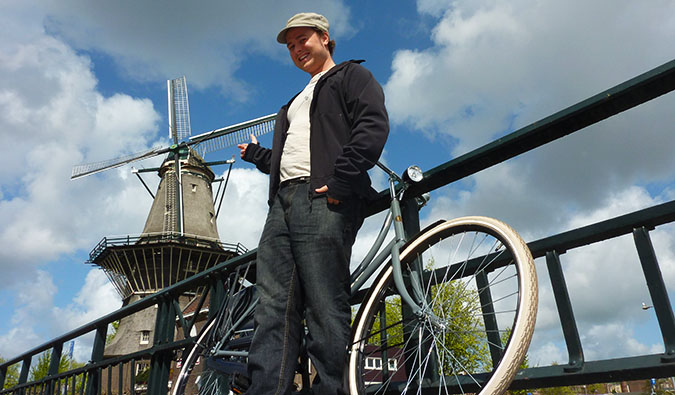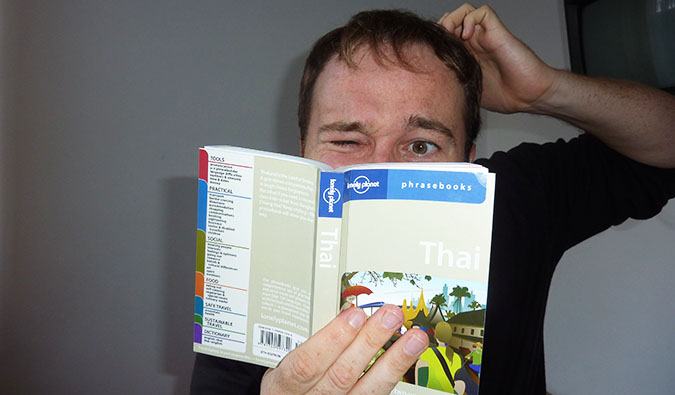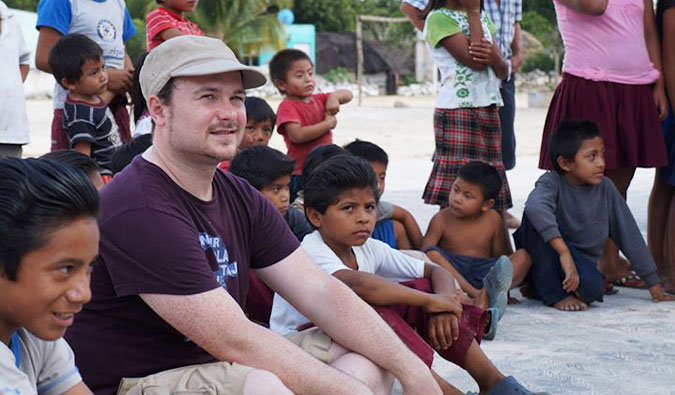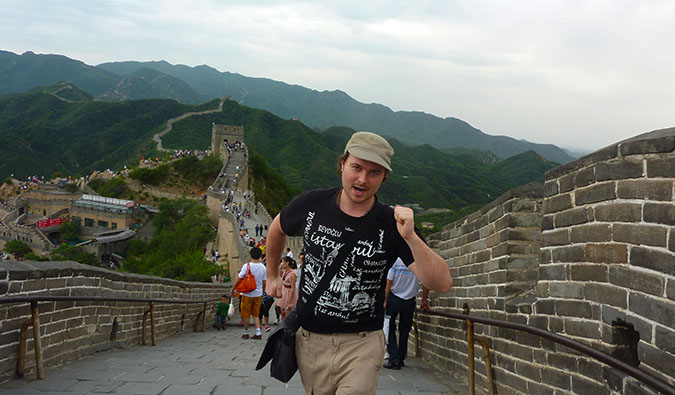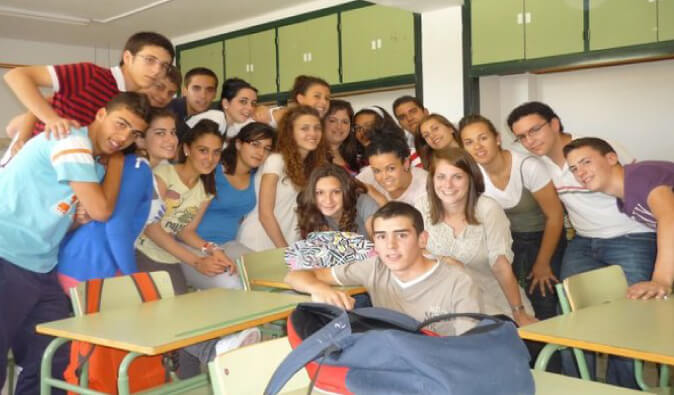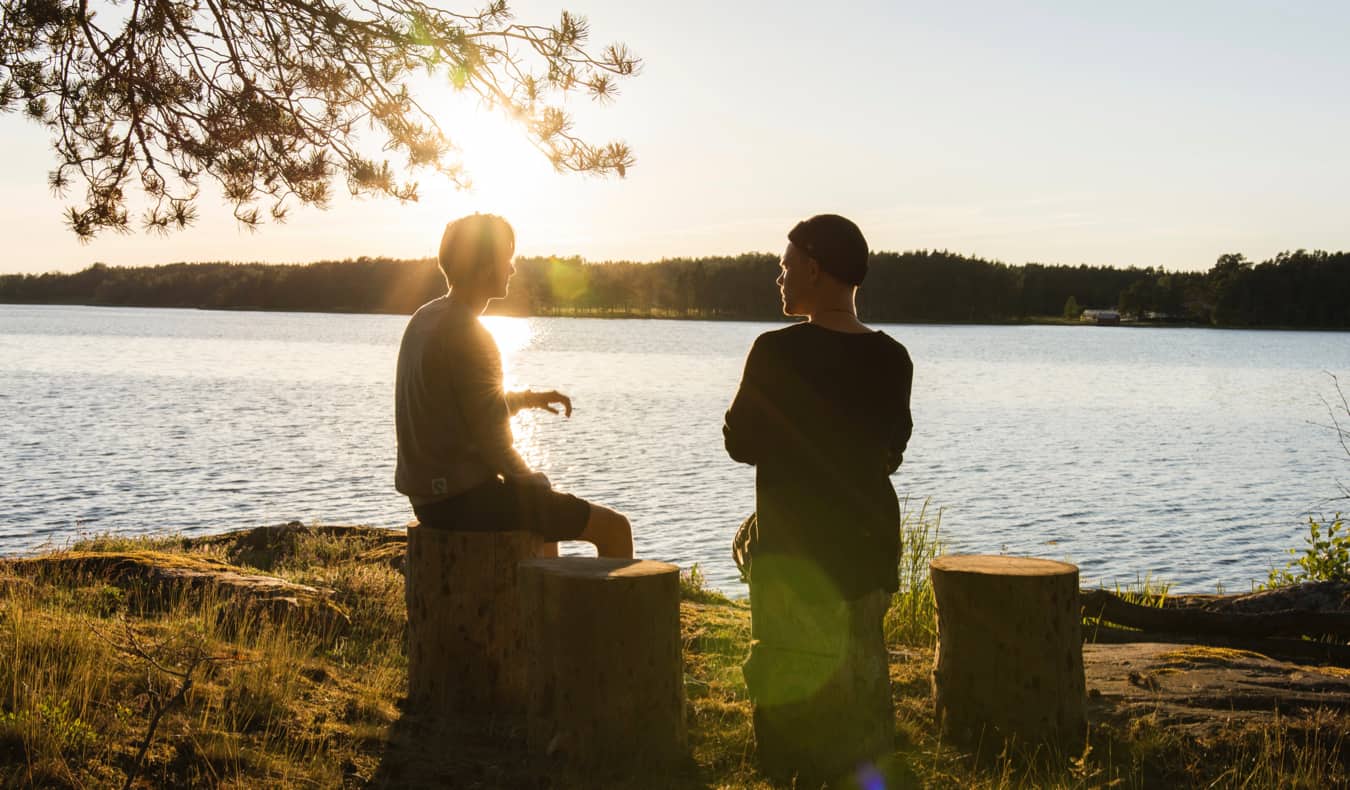
Updated: 08/13/2018 | August 13th, 2018
I’ve always been bad at languages. I barely made it through high school Spanish and have forgotten all the French I hired a tutor to teach me. I’m cursed. Or so I thought until I became friends with Benny Lewis from Fluent in 3 Months. Benny has mastered a method for learning languages that has helped me break languages down into smaller, more easily learnable parts. With his help, I’ve remembered a lot of my Spanish, learned Thai, and picked up some Swedish.
Today, I turn the blog over to Benny (who just published a book on language learning) to share how you can learn the basics of any language for your next trip. Knowing just a few basic phrases goes a long way when you travel and puts you in the good graces of the locals.
Here is Benny:
Way too often, we arrive in a country and think to ourselves, “Man, I wish I took some time to learn the basics of this language before I got here!” Or maybe you think anything less than mastering the language is not useful enough to invest time in. But even if you only have a month or a week before your trip, or even if you fly out tomorrow, you still have time to learn some basics of the local language. You only need a short period of time to master a few key words and phrases. And no, you don’t need to be a language genius to pick up the basics fast.
I spoke only English until I was 21. I nearly failed German in school, and I lived in Spain for six months without being able to learn the language — because I was doing it wrong. Fast forward to now: I speak around a dozen languages and counting, and it’s because I make my study hours work for me, practice speaking the language right away, and don’t waste my time studying what I won’t need. Even with just the basics in a language, I’ve had amazing experiences, like receiving my Chinese name on a train in the middle of China…just because I understood the question, “What’s your name?”
Here are four steps to basic fluency:
Step 1: Be specific with your goals
A huge mistake many people make is trying to take on too much at once. Having high goals and wanting to become fluent in a language, or even mastering it someday, is a noble goal, but this isn’t going to help you right now with your looming travel plans.
To be successful in learning what you need for your trip, you need as much specificity as possible. I’m lucky enough to typically have three whole months before a trip, in which I can devote most of my days to learning a language, and that makes fluency a realistic target.
I’ve had tighter deadlines, though, and was still able to work with them. Hell, even when I had one single hour of time before my trip to Poland, since I needed to prepare for my TEDx talk on language learning in Warsaw in English, I still took that time to learn enough basic Polish to be able to stretch it into a half-hour Skype call (constantly looking up words to keep the basic chat alive).
The way you do this is to know precisely what you need to learn and to learn only that.
In your mini-project:
- You need specificity — Do NOT have a vague goal like “learn Spanish.” If you want to go abroad in June, say to yourself that you want to be “basic conversational in three months,” given that you’ll put 10 hours a week into it. If you only have a month, then go for “very confident tourist in 30 days,” and put an hour a day into it or more if you can. If you have a flight out in three days, then take two or more hours each one of the next three days, and aim for “get by with basic necessities well in 72 hours.”
- You need to build a you-specific vocabulary — Guidebooks are great for general phrases like “how are you?” but you’re more complicated than that. So spend your study time tailoring your vocabulary to your specific needs. Step 2 below shows you how to start.
Step 2: Learn the words YOU will use
If you’re starting from scratch, the first thing you need to do is think about which words you’ll be using most on a daily basis in whatever situations you might be in — starting a conversation, sitting at a bar, talking about yourself, ordering in a restaurant, whatever it is. Then:
- Sit down and write out a self-introduction in English — Introduce yourself to an imaginary stranger. Tell them where you’re from, what you do, why you’re traveling, and so on. Then take a look at what you’ve got and pick out specific words you think will be most important for your abroad vocabulary, translate them, and then use a website like forvo.com (actually spoken by a native) or Google Translate (produced via automation) to hear how they’re pronounced in that language. In my case, the first words I’ll always need to learn first are “Irish” (my nationality), “blogger” (my job), and “vegetarian” since I’m a traveling vegetarian. Figure out what your words are and commit them to memory first.
- Make a list of foods you like, things you want to do, and other daily necessities — Everyone needs to know the word for “bathroom” pretty much on their first day abroad, so go ahead and add that to your list. But also include things that you as an individual can’t live without. Whether it’s coffee or Diet Coke, sandwiches or oysters, know the words for your go-to foods. And if you plan to try anything in particular while you’re there, like yoga, zip-lining, or dipping in a hot spring, learn those too. Because I’m a vegetarian, for example, I have to learn the words for pork, ham, bacon, sausage, chicken, beef, and fish — so I can ask the waiter for something without these foods in them. Whatever it is that you’ll be asking about, jot it down, look up the translations, and make yourself a cheat sheet.
- Look up a list of cognates, or words that are similar between the languages — It’s actually impossible to truly “start from scratch” when you’re learning a new language. Many languages have very long lists of words you already know the meaning of (albeit with slightly different pronunciations). If “sandwich” is on your list of favorite foods, for example, you already know how to say it in French. In Spanish, hospital is still hospital, and in German the word for fish is pronounced exactly the same. Even a very different language like Japanese has a ton of these “loanwords” for everyday things you might need like coffee, milk, and glass.
- Use mnemonics to learn unfamiliar words — To remember new words really fast that are nothing like what you’re used to in English, try using a fun mnemonic — an image or story that you associate with a particular word. Sounds silly, but it works. When I was learning French, for instance, I remembered that gare was “train station” by visualizing a big fat orange Garfield running out of breath through a train station to catch a train to a lasagna-eating competition, with lots of color and sounds in my mind to make it really stick. This technique works wonders, and creating this image in my mind made the gare–train station association stick much faster than it ever would have by rote repetition alone.
Resources:
- List of really useful online free dictionaries
- Memrise.com (fantastic online resource to suggest fun and easy-to-remember mnemonics)
- Forvo (hear words pronounced by a native speakers)
- Google Translate
Step 3: Learn whole phrases
With the short time frame you have, you don’t have time to try to understand the grammar of the language. I highly recommend that you skip over grammar studies, which are better suited to later in language learning anyway, and instead just memorize a few whole sentences so that you can convey your point in already-formed phrases.
- Get a guidebook, but ignore most of it — Guidebooks are great for the essentials, but you won’t need most of what’s in them. Those books try to cater to everyone’s needs, and everyone’s needs are not your needs. Skim through the book and highlight the phrases you will need, like “Where is the bathroom?” or “How much does this cost?” or “Excuse me, do you speak English?” Ignore the rest, and focus only on what’s useful to you. I like Lonely Planet phrasebooks, or you can use this online list of basic phrases.
- Create your own sentences, and have them checked if possible — Try your best to create a translation by piecing the words together, or (more ideally) changing a single word in a pre-made sentence in your phrasebook. For example, I might replace the word “bathroom” with “supermarket” in the pre-made phrase “Where is the bathroom?” and the resulting sentence is likely to be grammatically correct. You can even use Google Translate for the whole sentence. You can submit your pre-made sentence to the site Lang-8 to have native speakers correct it for free if your phrase is short enough, and they can get back to you surprisingly quickly.
- Start focusing on how your phrases sound in the language — Once you have your master list of words and phrases, you need to hear how native speakers pronounce them. If you don’t know any native speakers in the language, it doesn’t matter — there are free websites like Rhinospike that let you submit sentences you want to hear spoken, and they’ll send back a translation of your phrase, spoken by a native.
Once you know how the words sound, you need to commit them to memory. One trick that works for me is to sing the phrases out to myself. When I was learning Italian, for instance, I sang, “Where is the bathroom?” in the tune of the Big Ben chime, and took Dove si trova il gabinetto? and had it roll of my tongue easier. Putting the words to a tune will cement them into your memory and give you great solo-pronunciation practice.
Resources:
- For a good list of phrases you’ll need: Lonely Planet phrasebook or the Omniglot phrase list
- Lang-8 (get your attempted translations corrected by a native)
- Rhinospike (hear whole phrases spoken by a native)
Step 4: Use it before you fly
With these tips, you can actually cram enough of the language into your mind to have something genuinely useful for when you arrive in the country. But there is one final — and extremely helpful — thing you can do before you go to make sure it all goes smoothly:
- Practice with a native speaker in advance — It doesn’t matter where you live. Websites like italki allow you to either set up a free exchange (so that you “pay” for a language lesson by helping someone with their English for 30 minutes first) or get really affordable lessons (I got Japanese lessons for just $5/hour, for instance), and set up a quick session on Skype to use what you know with a native right now from home. You’ll hear what someone speaking to you spontaneously truly feels like, see where your weaknesses are in advance of needing to use the language in the real world and be able to address problems or questions that have been on your mind.
- Role-play to discover what you’re missing – Use your time chatting with a native online to play out the real-life situations you’ll be in abroad. For instance, you can practice ordering a complicated vegetarian meal or renting a hotel room well before you have to do it for real. As you go, you’ll discover there are words you need that you don’t know. For example, maybe you didn’t realize how often you want to talk about your cat or significant other. When you find these holes in your vocabulary, write down the words you need and add them to your master list.
This way, you hit the ground running and are already an “experienced” speaker, knowing what it’s like to speak with a native, and are simply keeping up your momentum.
Remember it’s OK to make mistakes!
When I was learning German, I once tried to tell my (female) friend that I had just made a “cool” video and asked if she wanted to come upstairs to see it. Sounds innocent enough, right? Somehow, what I actually said was, “I’m horny, and I want you to come inside me,” since the German word for “cool” also means “horny” (geil), and “come” in German has sexual connotations as it does in English if you use it wrong.
We had been friends for a long time, so she knew I wasn’t flirting with her — I explained my mistake and we laughed it off. It turned out that the world didn’t end, and to this day we are still good friends.
I’ve also managed to let it slip that I’m pregnant in Spanish (embarazado/a), and in my initial weeks learning French, somehow kept saying, “Thank you, nice-ass!” instead of “Thank you very much” (merci beaucoup versus merci beau cul). And when I arrived in Brazil and wanted to say “thank you” to the immigration officer (obrigado), I instead said, “chocolate bonbon!” (brigadeiro).
In each one of these cases, the person I was speaking to was well aware of the fact that I was still a learner, knew I didn’t mean what it sounded like, and was smart enough to see from the context what I actually meant. Rather than scold me for my “unforgiveable” mistake, they smiled and thought it was great that I was trying, in many cases congratulating me for my effort.
So don’t worry about being perfect in a new language. You don’t need a lot of time or even a lot of skill to pick up the language of your next destination. You just need a plan. Make your study time all about you, and remember not to get bogged down in irrelevant words, phrases, and grammar you won’t need.
While many people think that learning a language can only be a challenge that requires years of time, I hope you’ve seen in this article that you can absolutely get to a stage of having something very useful for your trip in a really short time. You just need to be very specific in what you’re aiming for, learn words and phrases that are relevant to you and what you’re likely to say, and not try to absorb the entire language.
Finally, you don’t need to arrive to see if you are ready. It’s better to get online and talk to someone today to clear up all your final problems and questions so that you arrive ready to confidently use what you know.
Benny Lewis was a language dud in school, but after graduating as an engineer he found that language talent is irrelevant and that with the right attitude and approach, anyone can learn a language. His book, Fluent in 3 Months, was published by HarperCollins and shares all of his best language-learning tips.
Book Your Trip: Logistical Tips and Tricks
Book Your Flight
Find a cheap flight by using Skyscanner. It’s my favorite search engine because it searches websites and airlines around the globe so you always know no stone is being left unturned.
Book Your Accommodation
You can book your hostel with Hostelworld. If you want to stay somewhere other than a hostel, use Booking.com as it consistently returns the cheapest rates for guesthouses and hotels.
Don’t Forget Travel Insurance
Travel insurance will protect you against illness, injury, theft, and cancellations. It’s comprehensive protection in case anything goes wrong. I never go on a trip without it as I’ve had to use it many times in the past. My favorite companies that offer the best service and value are:
- SafetyWing (best for everyone)
- Insure My Trip (for those 70 and over)
- Medjet (for additional evacuation coverage)
Want to Travel for Free?
Travel credit cards allow you to earn points that can be redeemed for free flights and accommodation — all without any extra spending. Check out my guide to picking the right card and my current favorites to get started and see the latest best deals.
Need Help Finding Activities for Your Trip?
Get Your Guide is a huge online marketplace where you can find cool walking tours, fun excursions, skip-the-line tickets, private guides, and more.
Ready to Book Your Trip?
Check out my resource page for the best companies to use when you travel. I list all the ones I use when I travel. They are the best in class and you can’t go wrong using them on your trip.
